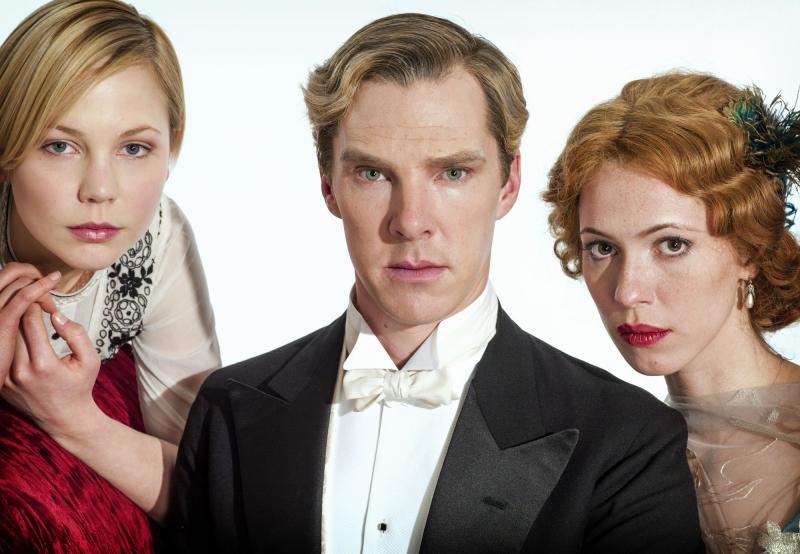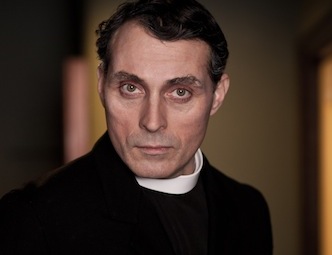


Television schedules seem not to matter much any more, since we can now watch on repeat more or less any time we choose. But it still seems strange that the BBC are airing their new five-part period drama, which is part-funded by the HBO network to the tune of £12 million, on a Friday evening in the middle of August – even though it’s turned out to be ideal weather for staying in.
In other words it reeks of serious quality drama, but one, since it’s set at the cusp of and during the First World War, that still has room for Downton Abbey [3]comparisons. Win, win. There’s also a whiff of Birdsong [4]in there, though any further nod in that direction would be pushing it, since the two authors occupy opposite literary hemispheres. Ford Madox Ford wasn’t the Sebastian Faulks of his day, though who can say whether anyone will be reading Faulks in 80 years' time?
Occasionally, Hall and Cumberbatch appear to be acting in different dramas
The till now neglected quartet of novels that make up Parade’s End are difficult, elusive, impressionistic. Ford wrote his tetralogy between 1924 and 1928 and the books look back upon an England that disappeared almost overnight with the coming of war. But neither the books nor the adaptation are interested in revisiting the myth of a pre-war golden age: firstly, we get a small sense of things already stirring afoot in old England, but, more importantly, it’s the exploration of an interior life that matters here. Events unfold through the eyes of its central character, and often events give way to unstructured, fragmentary thought-impressions. Ford doesn’t quite go as far as Joyce in disrupting linear narrative, but there are serious challenges for an adaptation.
Benedict Cumberbatch [5] plays Christopher Tietjens, billed as “the last Tory” and “the cleverest man in England”. Indeed, there is something of the Sherlock Holmes in this brilliant government statistician, though here Cumberbatch adopts a deeper voice, and wears blond highlights and a fat suit. His forensic intelligence – put to use not in sleuthing but in making corrections in the margins of the Encyclopaedia Britannica – together with a clinical air of impenetrability, both intrigue and drive his faithless wife into a fury, so much so that she wishes to puncture her husband’s stiff moral rectitude by sexually tormenting him.
As the shallow, spoilt and self-absorbed wife whom Tietjens marries when she falls pregnant with a child which may or may not be his, Rebecca Hall [6] appears somewhat miscast. Hall’s face and gestures flicker with a sensitive intelligence which she struggles to play against and which seem quite at odds with Sylvia Tietjens's monstrous character. Perhaps Hall might have swapped roles with Adelaide Clemens, who, as Valentine Wannop, is the young, in fact alarmingly young-looking, suffragette whom Tietjens falls for. Yet even Wannop’s impish, sparring feistiness goes strangely flat during her exchanges with Tietjens.
 There are problems, too, with an erratic tone, as we find we’ve occasionally veered into daft comedy. Rufus Sewell, as the mad, scatological Reverend Duchemin (pictured right), seems to have wandered in as a character extra from Cold Comfort Farm. And Sylvia’s foot-stamping, upper-class ennui plays against the grain not just of Hall’s instincts as an actor but of much of the writing and direction elsewhere. Occasionally, Hall and Cumberbatch appear to be acting in different dramas.
There are problems, too, with an erratic tone, as we find we’ve occasionally veered into daft comedy. Rufus Sewell, as the mad, scatological Reverend Duchemin (pictured right), seems to have wandered in as a character extra from Cold Comfort Farm. And Sylvia’s foot-stamping, upper-class ennui plays against the grain not just of Hall’s instincts as an actor but of much of the writing and direction elsewhere. Occasionally, Hall and Cumberbatch appear to be acting in different dramas.
Stoppard and Susanna White, who directs, have been valiantly ambitious in trying to tame Ford’s magnum opus for the screen, but unwelcome confusions remain. I watched the first episode twice and I’m not sure these were cleared on a second viewing. I shall, however, continue to watch with interest since, despite its flaws and whatever difficulties remain in capturing it, there's substance here.
Links
[1] https://theartsdesk.com/users/fisunguner
[2] https://www.addtoany.com/share_save
[3] http://www.theartsdesk.com/tv/downton-abbey-series-2-finale-itv1
[4] http://www.theartsdesk.com/tv/birdsong-bbc-one
[5] http://www.theartsdesk.com/topics/benedict-cumberbatch
[6] http://www.theartsdesk.com/film/awakening
[7] https://theartsdesk.com/node/51287/view
[8] https://theartsdesk.com/node/76255/view
[9] https://theartsdesk.com/node/77621/view
[10] https://theartsdesk.com/node/78842/view
[11] https://theartsdesk.com/tv
[12] https://theartsdesk.com/topics/reviews
[13] https://theartsdesk.com/topics/benedict-cumberbatch
[14] https://theartsdesk.com/topics/tom-stoppard
[15] https://theartsdesk.com/topics/modernism
[16] https://theartsdesk.com/topics/world-war-one